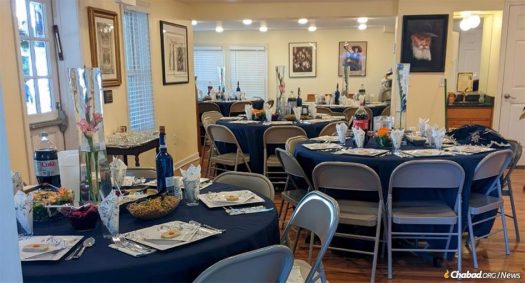
After Salman Rushdie Stabbing, Chautauqua Residents Find Comfort at Chabad
by Mendel Super – chabad.org
The idyllic lakefront town of Chautauqua, in Western New York, just over the Pennsylvania state line, was a serene spot, a place where about 10,000 people stay over the summer, engrossed in intellectual activity, culture, and recreation. “It’s a unique place,” local resident Danny Shuman tells Chabad.org, “almost removed from the world, where kids roam and cycle freely without a care in the world.”
That tranquility was shattered on Friday, Aug. 12, when novelist Salman Rushdie was stabbed on stage at the Chautauqua Institute’s amphitheater, a little before 11 a.m. “It’s clear the atmosphere here has changed,” says Chautauquan Mark Weisman somberly. “A gray cloud has come over the place.” While Weisman says the ongoing presence of New York State troopers in the village is jarring, he notes that the “disgusting, abhorrent” incident is an isolated one, “as sick as it was.” The response, he says, “should not be to alter our path.”
As people fled the horrifying scenes at the amphitheater, some made their way to Chabad-Lubavitch of Chautauqua— directed by Rabbi Zalman and Esther Vilenkin—a mere 1,000 feet away. “People were looking for like-minded connectivity, and being at Chabad can be very comforting,” says Weisman. “It’s a therapeutic environment.”
Two hours later, Chabad’s weekly family Challah bake attracted a larger than normal crowd. “The rabbi spoke about that morning’s events and offered words of comfort,” says Shuman, whose father was at Rushdie’s talk. “We observed a moment of silence, said a prayer and gave charity—it’s so important to increase in goodness and kindness at such a time.”
“People were looking for a place of comfort, of community and direction,” Rabbi Zalman Vilenkin says. Friday night, usually a quieter, more intimate affair—the larger crowds attend the Shabbat service and kiddush the next morning—saw almost 50 people join the meal, “people who never came before,” Vilenkin adds. “They wanted a sense of normalcy.”
“Shabbat served a very important purpose that evening,” reflects Weisman, who says he found personal solace attending Chabad after his father passed away, when a friend suggested he say kaddish for his father’s memory. “I’ve become more observant since my parents’ passing,” he adds.
“Throughout Shabbat the incident was on everyone’s minds,” says Shuman. “Chabad offered a lot of comfort and was able to turn an act of hatred into a springboard for goodness.”
This article has been reprinted with permission from chabad.org













